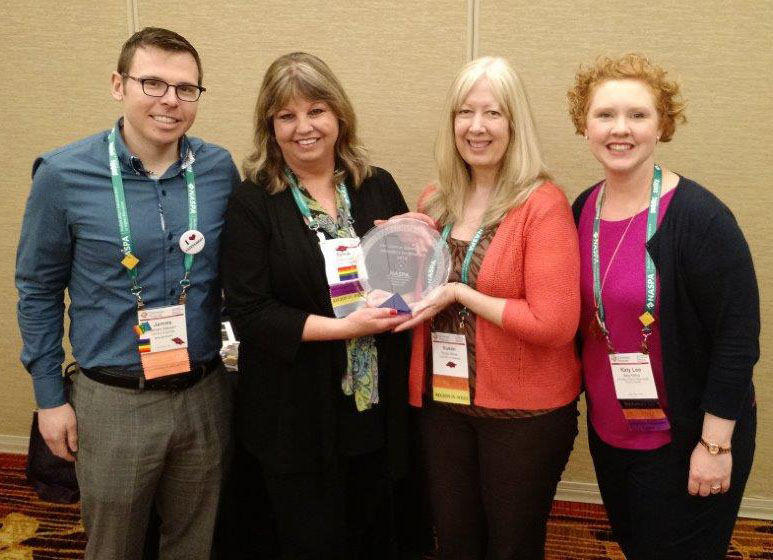
At the National Association of Student Personnel Administrators (NASPA) annual conference Off Campus Connections was awarded recognition for Outstanding Undergraduate Adult Learner Program.
The award recognizes “an outstanding entity/program within a higher education institution that provides exceptional support — characterized by a collection of creative methods — to undergraduate adult learners.”
Nominees and award recipients must be knowledge communities that break new ground in serving adult learners, raise awareness in the surrounding community, and make an exceptional impact.
Award criteria for proposals included:
- Addresses needs of undergraduate nontraditional students or adult learners to encourage persistence
- Shows involvement, inclusion, and collaboration with others
- Uses innovative and creative methods, practices, or activities
- Imbedded with a practice of outcomes and assessment
Sylvia Scott, director of OCC, and Susan Stiers, associate director of OCC, accepted the award for the office at the conference. Both administrators have been with the department since 2004. Stiers’ main focus in the department is adult learners, and both Stiers and Scott prepared the proposal that shows a comprehensive look at all of the work and support OCC gives to the undergraduate nontraditional student community at the University of Arkansas.
Highlights from OCC’s proposal were collaborations with campus and community entities resulting in scholarships for adult learners, recognition and inclusion programs for nontraditional students, and awareness efforts and resources for the community and students alike.
“I think what we wanted to focus on more than anything was the recognition pieces, because our adult learners need support — personal support,” Stiers said.
“Their lives don’t always allow for a lot of the traditional experiences, so that kind of leaves it lacking in a traditional student environment,” Scott said. “These students might be working or have families and responsibilities outside of school, and they’re just trying to get through class.”
Off Campus Connections focuses on finding nontraditional students who come from all different backgrounds and motivations for pursuing their degrees and providing them with a personal connection and relationship they can lean on through the realities of being a nontraditional student on a traditional campus.
“They feel like others look at them and don’t see a student because they sometimes don’t look like a traditional student, and we want them to know that they are recognized, they are appreciated, and they are not invisible,” Scott said.
Along with the proposal, nominees for the award were required to submit a letter of support from their institution. Alice Griffin, director of curriculum review and program assessment, gave her support to Off Campus Connections for the award. Griffin gave her support not only for OCC’s commitment to supporting the academic pursuit of students, but for their willingness to go the extra mile for adult learners.
“Without their efforts many of our adult learners would likely feel overwhelmed from the multitude of obstacles they face to stay engaged in school,” Griffin wrote. “I wholeheartedly endorse this team for this award.”
“I think what we wanted to focus on more than anything was the recognition pieces, because our adult learners need support — personal support.”
While the Off Campus Connections office received recognition for their effort this year, the Scott and Stiers have been hard at work helping to build up the knowledge community within NASPA since they started.
Stiers said the OCC office has been gathering and compiling resources for the non-traditional learners community, which has been invaluable not only for their work at the University, but also for the knowledge community at large.
“If we were to start this office now with this knowledge community in place, it would be a completely different experience,” Stiers said. “We really had to do all of the groundwork to get the Off Campus Connections office to the place it is today, helping not only students with children but adult learners and freshmen commuters.”
Many schools only have a students with children office, which can leave out some dimensions of non-traditional students. The Off Campus Connections office has three focuses– freshmen commuters, nontraditional adult learners, and off campus living.
Stiers said all non-traditional students need is someone to listen to their issue and be able to refer them to the correct office.
“A lot of times, its just helpful to have someone to talk to and someone to answers their questions – someone who understands that they haven’t had the traditional experience and won’t look at them any differently because of that,” Stiers said.
“A lot of times, its just helpful to have someone to talk to and someone to answers their questions – someone who understands that they haven’t had the traditional experience and won’t look at them any differently because of that.”
In their proposal to NASPA, Scott and Stiers used Nancy K. Schlossberg’s theory of mattering, which emphasizes the need for students to have a deep sense that they matter to the campus community through involvement and engagement on campus.
“The sense of mattering – that’s what our students need,” Scott said. “They need somebody who knows they can do it, and who can help them not feel so out of sorts and out of place, somebody who understands and gets it.”
“No one should ever assume they know what a student looks like,” Stiers said. “Our students came from all walks of life, whether they are just coming back to school after raising a family or continuing their education a little later in life, just because they don’t meet the traditional expectations of being a student should not make them any different.”
With the youngest student enrolled being 14 and the oldest being 95, the diverse walks of life that students come from need to be acknowledged and supported, Scott said, and the support available for traditional students will in many cases not be enough for non-traditional students.
“Whatever they need to help them get their education, and we do whatever we can to remove those obstacles that are standing between them and graduation. We can’t always remove them for them, but we can referrer them places and help them cut through what stands in their way,” Scott said. “It’s really the little things that make all of the difference.”
The OCC office is about advocating for the differences and building relationships across campus to support students in their academic pursuits.
“Arkansas, as a state, has a lot of work to do to get adult learners into the classroom, and we want to make it just that much easier for adult learners and non-traditional students to the University of Arkansas to pursue their education,” Scott said.
Not only is the OCC office staff available to help students, but the office also offers several scholarship and recognition programs for non-traditional students.
“We decided we needed to find a way to redefine leadership for non-traditional students,” Stiers said. “For students who are older, maybe they’re working or they have families, they don’t have time to join an RSO and be a president, but if you’re working a job while going to school and are showing leadership qualities there or you’ve gone back to school to complete your education so you can take on more responsibilities, you should be recognized for that leadership. There are so many ways for students to show leadership in a non-traditional way.”
In 2006, the Alumni Association Outstanding Non-Traditional Student Leadership Award was created, which gives a $500 award to two eligible undergraduate students who have demonstrated excellence in achievements as a student while successfully engaged in life issues.
“There are so many stories of students who are coming back to school to be a role model for their child, maybe nobody in their family went to college. They lived in poverty. It’s heart wrenching the stories that we see, but they keep on going and showing up to class and achieving,” Stiers said.
“The sense of mattering – that’s what our students need. They need somebody who knows they can do it, and who can help them not feel so out of sorts and out of place, somebody who understands and gets it.”
The office also works with Chartwells to provide a food scholarship – the Chartwells Non-Traditional Student Meal Scholarship.
This scholarship is awarded to ten undergraduate, non-traditional commuters enrolled for each fall and spring semester. Each scholarship covers one off-campus meal plan of 25 meals + $50 flex valued at over $200 a semester.
Because of the limited space on campus, much of the student growth over the past several years has resulted in more students living off campus, and the OCC office saw this need and stepped in to advocate for those students. Approximately 7,000 new beds have been filled off campus since 2010, and 15,400 undergraduate students are living off campus.
The OCC office is currently working on building an educational plan for undergraduates who are moving off campus to help them understand what all goes into living on their own, from landlords and roommates to lease agreements. OCC has been doing campus-wide workshops this year and is developing an online module for students in the University Perspectives class to view next year.
Whether it is a student commuter dealing with the realities of living on their own or an adult learner needing to navigate the traditional world of campus life, the Off Campus Connections office wants to support students so they can achieve their academic goals.
